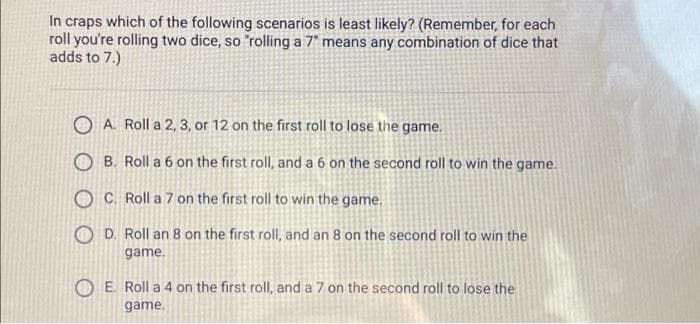In craps which of the following scenarios is least likely? (Remember, for each roll you're rolling two dice, so "rolling a 7" means any combination of dice that adds to 7.) O A. Roll a 2, 3, or 12 on the first roll to lose the game. O B. Roll a 6 on the first roll, and a 6 on the second roll to win the game. O C. Roll a 7 on the first roll to win the game. O D. Roll an 8 on the first roll, and an 8 on the second roll to win the game. O E. Roll a 4 on the first roll, and a 7 on the second roll to lose the game.
In craps which of the following scenarios is least likely? (Remember, for each roll you're rolling two dice, so "rolling a 7" means any combination of dice that adds to 7.) O A. Roll a 2, 3, or 12 on the first roll to lose the game. O B. Roll a 6 on the first roll, and a 6 on the second roll to win the game. O C. Roll a 7 on the first roll to win the game. O D. Roll an 8 on the first roll, and an 8 on the second roll to win the game. O E. Roll a 4 on the first roll, and a 7 on the second roll to lose the game.
Calculus: Early Transcendentals
8th Edition
ISBN:9781285741550
Author:James Stewart
Publisher:James Stewart
Chapter1: Functions And Models
Section: Chapter Questions
Problem 1RCC: (a) What is a function? What are its domain and range? (b) What is the graph of a function? (c) How...
Related questions
Question
In craps which of the following scenarios is least likely? (Remember, for each roll you're rolling two dice, so "rolling a 7" means any combination of dice that adds to 7.) O A. Roll a 2, 3, or 12 on the first roll to lose the game. B. Roll a 6 on the first roll, and a 6 on the second roll to win the game. C. Roll a 7 on the first roll to win the game. D. Roll an 8 on the first roll, and an 8 on the second roll to win the game. O E. Roll a 4 on the first roll, and a 7 on the second roll to lose the game.

Transcribed Image Text:In craps which of the following scenarios is least likely? (Remember, for each
roll you're rolling two dice, so "rolling a 7" means any combination of dice that
adds to 7.)
O A. Roll a 2, 3, or 12 on the first roll to lose the game.
O B. Roll a 6 on the first roll, and a 6 on the second roll to win the game.
O C. Roll a 7 on the first roll to win the game.
O D. Roll an 8 on the first roll, and an 8 on the second roll to win the
game.
O E. Roll a 4 on the first roll, and a 7 on the second roll to lose the
game.
Expert Solution
This question has been solved!
Explore an expertly crafted, step-by-step solution for a thorough understanding of key concepts.
This is a popular solution!
Trending now
This is a popular solution!
Step by step
Solved in 4 steps with 5 images

Recommended textbooks for you

Calculus: Early Transcendentals
Calculus
ISBN:
9781285741550
Author:
James Stewart
Publisher:
Cengage Learning

Thomas' Calculus (14th Edition)
Calculus
ISBN:
9780134438986
Author:
Joel R. Hass, Christopher E. Heil, Maurice D. Weir
Publisher:
PEARSON

Calculus: Early Transcendentals (3rd Edition)
Calculus
ISBN:
9780134763644
Author:
William L. Briggs, Lyle Cochran, Bernard Gillett, Eric Schulz
Publisher:
PEARSON

Calculus: Early Transcendentals
Calculus
ISBN:
9781285741550
Author:
James Stewart
Publisher:
Cengage Learning

Thomas' Calculus (14th Edition)
Calculus
ISBN:
9780134438986
Author:
Joel R. Hass, Christopher E. Heil, Maurice D. Weir
Publisher:
PEARSON

Calculus: Early Transcendentals (3rd Edition)
Calculus
ISBN:
9780134763644
Author:
William L. Briggs, Lyle Cochran, Bernard Gillett, Eric Schulz
Publisher:
PEARSON

Calculus: Early Transcendentals
Calculus
ISBN:
9781319050740
Author:
Jon Rogawski, Colin Adams, Robert Franzosa
Publisher:
W. H. Freeman


Calculus: Early Transcendental Functions
Calculus
ISBN:
9781337552516
Author:
Ron Larson, Bruce H. Edwards
Publisher:
Cengage Learning